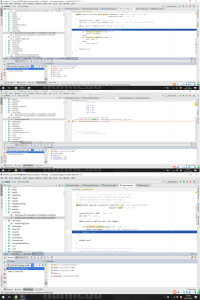2017年10月9日 课堂查找测试补写博客
2017-11-10 22:17
190 查看
测试截图

这个课堂测试并不难,测试成功后拼图的时候慢了一些,没来得及提交。这个测试的关键在于——明白查找的方法的参数类型为Comparable类型,所以在声明数组时创建为Comaparable类型的即可
测试代码
/**
* Created by 齐力锋 on 2017/10/9.
*/
public class SearchTest {
public static void main (String args[])
{
Comparable[] i = new Comparable[100];
i[0] = 3 ;
i[1] = 8;
i[2] = 12 ;
i[3] = 34 ;
i[4] = 54;
i[5] = 84;
i[6] = 91;
i[7] = 110;
i[8] = 23;
i[9] = 26;
Searching.linearSearch(i,54);
System.out.println("排序成功" + Searching.linearSearch(i,54) );
}
}
// Searching.binarySearch(i,45);
// Searching.binarySearch(i,54);查找的另一个测试代码
/**
* Created by 齐力锋 on 2017/10/9.
*/
//********************************************************************
// Sorting.java Java Foundations
//
// Contains various sort algorithms that operate on an array of
// Comparable objects.
//********************************************************************
public class Sorting {
//-----------------------------------------------------------------
// Sorts the specified array of integers using the selection
// sort algorithm.
//-----------------------------------------------------------------
public static void selectionSort(Comparable[] data) {
int min;
for (int index = 0; index < data.length - 1; index++) {
min = index;
for (int scan = index + 1; scan < data.length; scan++)
if (data[scan].compareTo(data[min]) < 0)
min = scan;
swap(data, min, index);
}
}
//-----------------------------------------------------------------
// Swaps two elements in the specified array.
//-----------------------------------------------------------------
private static void swap(Comparable[] data, int index1, int index2) {
Comparable temp = data[index1];
data[index1] = data[index2];
data[index2] = temp;
}
//-----------------------------------------------------------------
// Sorts the specified array of objects using an insertion
// sort algorithm.
//-----------------------------------------------------------------
public static void insertionSort(Comparable[] data) {
for (int index = 1; index < data.length; index++) {
Comparable key = data[index];
int position = index;
// Shift larger values to the right
while (position > 0 && data[position - 1].compareTo(key) > 0) {
data[position] = data[position - 1];
position--;
}
data[position] = key;
}
}
//-----------------------------------------------------------------
// Sorts the specified array of objects using a bubble sort
// algorithm.
//-----------------------------------------------------------------
public static void bubbleSort(Comparable[] data) {
int position, scan;
for (position = data.length - 1; position >= 0; position--) {
for (scan = 0; scan <= position - 1; scan++)
if (data[scan].compareTo(data[scan + 1]) > 0)
swap(data, scan, scan + 1);
}
}
//-----------------------------------------------------------------
// Sorts the specified array of objects using the quick sort
// algorithm.
//-----------------------------------------------------------------
public static void quickSort(Comparable[] data, int min, int max) {
int pivot;
if (min < max) {
pivot = partition(data, min, max); // make partitions
quickSort(data, min, pivot - 1); // sort left partition
quickSort(data, pivot + 1, max); // sort right partition
}
}
//-----------------------------------------------------------------
// Creates the partitions needed for quick sort.
//-----------------------------------------------------------------
private static int partition(Comparable[] data, int min, int max) {
// Use first element as the partition value
Comparable partitionValue = data[min];
int left = min;
int right = max;
while (left < right) {
// Search for an element that is > the partition element
while (data[left].compareTo(partitionValue) <= 0 && left < right)
left++;
// Search for an element that is < the partitionelement
while (data[right].compareTo(partitionValue) > 0)
right--;
if (left < right)
swap(data, left, right);
}
// Move the partition element to its final position
swap(data, min, right);
return right;
}
//-----------------------------------------------------------------
// Sorts the specified array of objects using the merge sort
// algorithm.
//-----------------------------------------------------------------
public static void mergeSort(Comparable[] data, int min, int max) {
if (min < max) {
int mid = (min + max) / 2;
mergeSort(data, min, mid);
mergeSort(data, mid + 1, max);
merge(data, min, mid, max);
}
}
//-----------------------------------------------------------------
// Sorts the specified array of objects using the merge sort
// algorithm.
//-----------------------------------------------------------------
public static void merge(Comparable[] data, int first, int mid,
int last) {
Comparable[] temp = new Comparable[data.length];
int first1 = first, last1 = mid; // endpoints of first subarray
int first2 = mid + 1, last2 = last; // endpoints of second subarray
int index = first1; // next index open in temp array
// Copy smaller item from each subarray into temp until one
// of the subarrays is exhausted
while (first1 <= last1 && first2 <= last2) {
if (data[first1].compareTo(data[first2]) < 0) {
temp[index] = data[first1];
first1++;
} else {
temp[index] = data[first2];
first2++;
}
index++;
}
// Copy remaining elements from first subarray, if any
while (first1 <= last1) {
temp[index] = data[first1];
first1++;
index++;
}
// Copy remaining elements from second subarray, if any
while (first2 <= last2) {
temp[index] = data[first2];
first2++;
index++;
}
// Copy merged data into original array
for (index = first; index <= last; index++)
data[index] = temp[index];
}
public static void main(String args[]) {
Comparable[] number = new Comparable[8];
number[0]= 3;
number[1] = 8;
number[2]=12;
number[3]=34;
number[4]= 54;
number[5] = 84;
number[6] = 91 ;
number[7] = 110;
Sorting.quickSort(number,0,7);
for (Comparable I :number)
System.out.println(I);
}
}
相关文章推荐
- 20162312张家铖 查找课堂测试补分博客
- hash课堂测试补分博客
- 第六周作业总结(内含查找排序课堂测试及课下作业报告)
- 20162316刘诚昊 10月9日“查找课堂测试”
- 20162312张家铖 10.9查找课堂测试
- 转载一篇关于软件测试的博客,方便以后查找。
- 20162313苑洪铭 查找练习课堂测试
- 迪杰斯特拉课堂测试补写博客
- 测试博客链接
- 2017-2018-1 20155208 课堂测试(ch06)(补做)
- 创建博客-使用HTTPie测试Web服务
- Mongodb 之insert瞬时完成,测试数据---飞天博客
- 测试下博客
- 用node.js建博客(五) - 用vows以BDD方式测试程序
- 课堂测试-单元测试(比较大小)
- 测试使用markdonw写博客
- 博客开通,首发文章测试一把:)
- 测试在csdn博客中插入代码
- 测试一下我的博客
- 我就是测试测试下开源中国的博客子系统是如何设计的!
